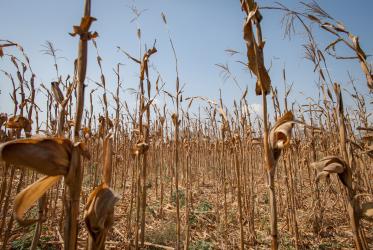“Hope in the future”
WCC General Secretary's message to the Rio+20 United Nations Conference on Sustainable Development and Peoples’ Summit
To our fellow human beings gathered to carry out our common responsibility for our common future,
“We write with a sense of urgency. The earth is in peril. Our only home is in plain jeopardy. For the very first time in the history of creation, certain life support systems of the planet are being destroyed by human actions”. These could be words for today, but were part of the letter to the churches written by participants of a WCC meeting in Baixada Fluminense during the UN Conference on Environment and Development (UNCED or Earth Summit) in Rio de Janeiro, Brazil in 1992. We, as people of faith in God, still believe and hope in the future.
Unfortunately, the situation has not improved in these last twenty years. On the contrary, scientific reports have shown that we are in an even more dangerous situation. Our children are asking why we have not been able to achieve more in these 20 years. And WCC member churches from various regions have consistently reported that vulnerable communities are already experiencing the negative effects of climate change and environmental degradation while poverty and inequity continue to be a major challenge. We are accountable to our Creator for what we have done and what we have not done for the one creation.
The Earth Summit in 1992 was a sign of hope for the future. From it, we received the so called Rio Conventions (on Biodiversity, Desertification and Climate Change), the Earth Charter and the Rio Declaration, which offered a framework to respond to the challenges posed to the environment. But the international community has not been able to implement effective responses, the failure of the climate negotiations in reaching a new binding agreement being a clear example. However, the Rio principles continue to be valid today and need to be explicitly reaffirmed when the world faces new challenges.
As the international community gathers at the UN Conference on Sustainable Development (UNCSD2012 or Rio+20), governments have the opportunity to recommit to past agreements and agree on a roadmap for the sustainable future we want[1]. Let us together believe that we can make changes for a better world, step-by-step. I am well aware that Rio+20 by itself will not change the world; but, it can and should be a catalyst for concrete initiatives to overcome the short term perspectives that have been predominant in recent international negotiations. The outcome from Rio+20 should therefore comprise a set of clear targets and timetables for a sustainable future which must include accountability and reporting measures.
Last year the WCC’s International Ecumenical Peace Convocation held in Kingston, Jamaica, addressed violence in its various manifestations. The Ecumenical Call for Just Peace clearly states that “human beings are to respect and protect creation. But greed at many levels, self-centeredness and a belief in unlimited growth have brought exploitation and destruction on the earth and its creatures. The cries of the poor and vulnerable echo in the groans of the earth. Excessive consumption of fossil fuels and other limited resources is doing violence to people and the planet. Climate change as a consequence of human lifestyles poses a global threat to just peace. Global warming, the rise of sea levels and the increasing frequency and intensity of droughts and floods affect especially the most vulnerable populations in the world.” Being aware how poverty, ecological crisis and violence are intertwined, justice and peace criteria should permeate the contents of a green economy, one of the main themes at UNCSD2012, which should be based in principles such as sustainability, dignity, equity, sufficiency, inclusion and resilience, dismantling and abandoning a “greed economy” to move into a sharing economy for the survival of all, rich and poor, and taking our responsibility for future generations. The present situation does not allow us to irresponsibly continue with business as usual. We must find a just peace with the earth and one another.
WCC delegates at Rio+20 will be involved in various activities both at the venue of the official UNCSD2012 and at the Peoples Summit. Together as people of many faiths, we are united in our concern and prayer for the future of our planet. The Religions for Rights cluster will raise various concerns and alternatives from an interfaith perspective. I urge government representatives to listen to the calls coming from communities, civil society at large and from us who represent people of faith and hope for change and let us hear you respond to our contributions and expectations of you.
The theme for the next WCC 10th Assembly to be held next year in Busan, Republic of Korea, is “God of life, lead us to justice and peace”. It is this God of life who encouraged ecumenical participants at the Earth Summit in 1992 to proclaim: “There is hope (2Cor 4:7-12). Our God is a God of life and the power of the Holy Spirit permeates all creation”.
We do have hope. Even in spite of hopeless circumstances (Rom 4:18), we believe God renews the whole creation through the Spirit (Psalm 104:30) so that life prevails. May the same Spirit inspire delegates at Rio+20 so that they can deliver a most needed, significant outcome to address the threats humanity and the earth are facing.
In solidarity and hope,
Rev. Dr Olav Fykse Tveit
WCC General Secretary
[1] « The future we want » is the title of the draft outcome document of the UNCSD2012.


